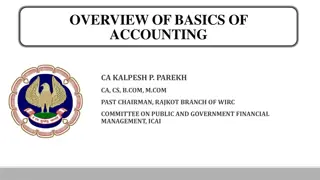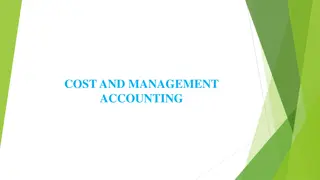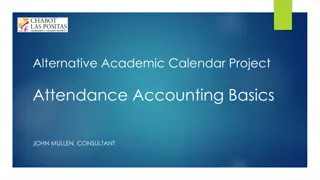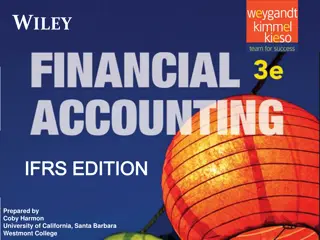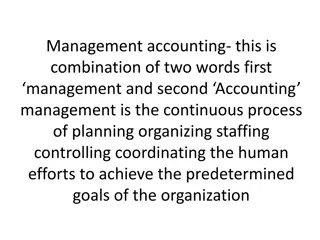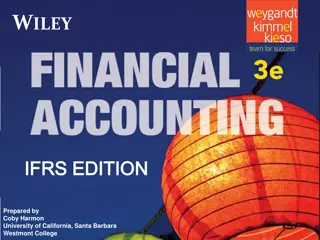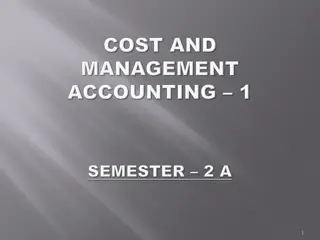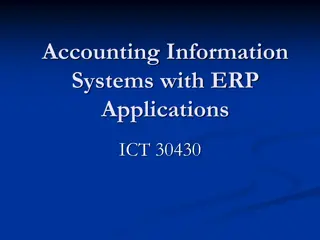Understanding Accounting Principles and Practices
Accounting is an essential information system that helps stakeholders make economic decisions by providing financial information about a business's activities and conditions. It involves recording, classifying, summarizing, and communicating economic information to enable informed judgments and decisions. The process includes identifying, measuring, recording, and communicating relevant economic events to internal and external users. Accounting plays a crucial role in maintaining records, ascertaining profit or loss, depicting financial position, and providing information for decision-making, statutory requirements, and more.
Download Presentation

Please find below an Image/Link to download the presentation.
The content on the website is provided AS IS for your information and personal use only. It may not be sold, licensed, or shared on other websites without obtaining consent from the author. Download presentation by click this link. If you encounter any issues during the download, it is possible that the publisher has removed the file from their server.
E N D
Presentation Transcript
Department of Business Administration Department of Business Administration
Accounting is an information system that provides quantitative, financial information to stakeholders about the economic activities and condition of a business so that they can make business/economic decisions
Accounting: Accounting is the are of recording, classifying and summarizing in a significant manner and in terms of money, transactions and events which are of a financial character and interpreting the result thereof (AICPA) Bookkeeping: only involves activities of collecting and recording financial data
The process of identifying, measuring, recording and communicating economic information to permit informed judgment and decisions by users of the information.
IDENTIFYING : Identify those events that are considered as an evidence of economic activity relevant to the business MEASURING : Measuring the events RECORDING : Keeping of a chronological diary of measured events in an orderly and systematic manner COMMUNICATING : Communicate through the preparation and distribution of accounting reports to the interested parties.
Internal Users External Users
Maintenance of Accounting Records Maintenance of Accounting Records Ascertainment of profit or loss Ascertainment of profit or loss Depiction of financial position Depiction of financial position Providing information Providing information
1. Systematic records 2. Preparations of financial statements 3. Assessment of progress 4. Aid to decision making 5. Statutory requirements 6. Information to interested groups 7. Evidence in courts 8. Taxation problems 9. Merger of firms Systematic records Preparations of financial statements Assessment of progress Aid to decision making Statutory requirements Information to interested groups Evidence in courts Taxation problems Merger of firms 1. 2. 3. 4. 5. 6. 7. 8. 9.
Financial Accounting Cost Accounting Management Accounting Financial Accounting Cost Accounting Management Accounting
TYPES OF ACCOUNTS TYPES OF ACCOUNTS IMPERSONAL ACCOUNTS IMPERSONAL ACCOUNTS PERSONAL ACCOUNTS PERSONAL ACCOUNTS REAL REAL NOMINAL ACCOUNTS ACCOUNTS ACCOUNTS
PERSONAL ACCOUNTS Accounts of persons with whom the business has dealings are known as Personal accounts. a) a) Natural persons b) c) c) Representative personal accounts outstanding expenses and accrued or prepaid incomes are personal accounts PERSONAL ACCOUNTS Natural persons b) Artificial persons : The name of an Individual : Firms accounts. Ltd co s, Bank etc., Representative personal accounts Artificial persons : All accounts representing
REAL ACCOUNTS Accounts in which the business records the real things owned by it. i.e, assets of the business are known as real accounts. REAL ACCOUNTS NOMINAL ACCOUNTS It relates to the items which exist in name only. Expenses, incomes etc., NOMINAL ACCOUNTS
Accounts Accounts Debit Debit credit credit Personal Personal Accounts Accounts The Receiver The Receiver The Giver The Giver Real Accounts Real Accounts What comes in What comes in What goes What goes out out All Expenses and Losses All Expenses and Losses All Income Gains All Income and Gains and Nominal Nominal Accounts Accounts





